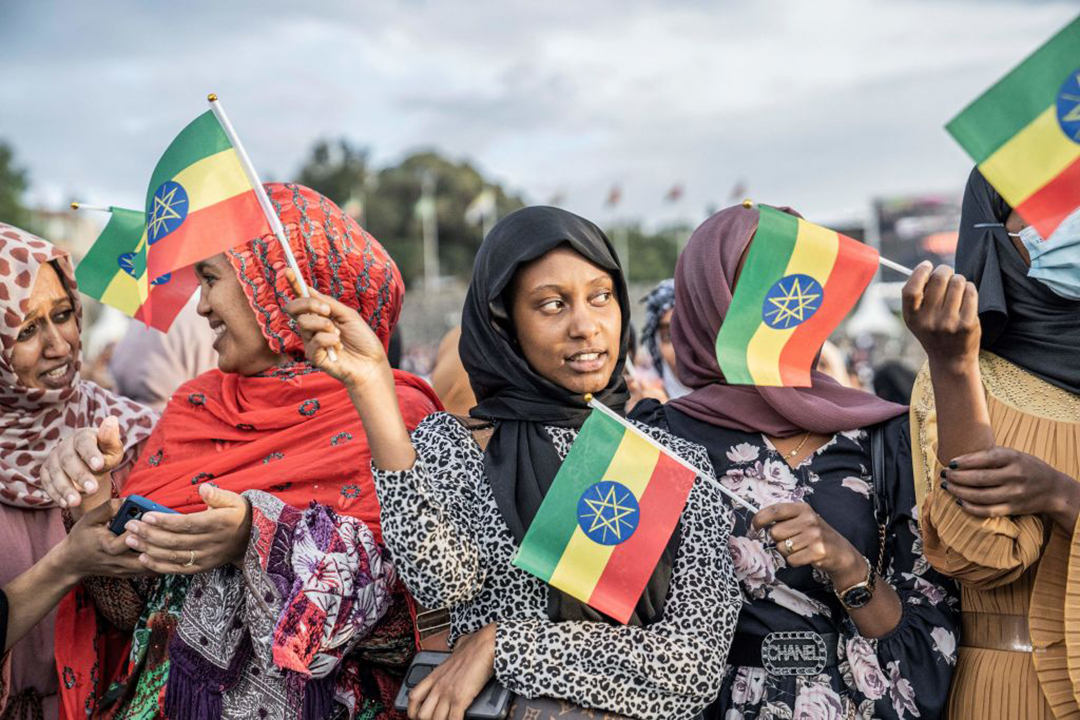Ethiopia Faces Obstacles on Path to Peace
ADF STAFF
There are signs of progress in the 19-month civil war that has thrown Ethiopia into chaos and displaced millions. A ceasefire brokered in March mostly has held, and humanitarian aid convoys are reaching areas affected by drought and famine. In May, African Union envoy Olusegun Obasanjo negotiated the release of 4,200 prisoners of war in what was termed a “confidence-building exercise.”
“There is now a real opportunity for political and diplomatic resolution of the conflict,” Obasanjo said earlier this year.
Despite this, major barriers remain to a lasting peace. Experts say if Ethiopia is to avoid a return to war, it must address several obstacles. ADF spoke to Dr. Bizuneh Getachew Yimenu, an expert on Ethiopian federalism and a lecturer in politics at the University of Kent, about the perilous path to peace.
Arms and Militias
Hundreds of ethnic militias, regionally aligned forces and other armed groups stalk rural Ethiopia. These forces are unaccountable to the rule of law and have been accused of some of the worst crimes of the war.
These groups represent a constant threat to a return to armed conflict.
Bizuneh says the key will be to bring some of the main groups into the peace process if they are willing to renounce violence. “The upcoming national dialogue should include them in order to address the legitimate grievances of those rebel groups and bring them to the negotiating table,” he said. “That would discourage other rebel groups from emerging. But the more the government is reacting to the rebel groups violently, the higher the chance for additional forces to emerge throughout the country.”
Other violent, ethnically-based groups that refuse to lay down arms can be stopped by military force, Bizuneh said. There is some evidence that Ethiopia is beginning this process. In May, government forces arrested more than 4,000 people affiliated with the Fano militia, an ethnic Amhara group accused of war crimes.
Bizuneh noted that lasting peace will require the government to stop the flow of weapons trafficked into the country. “The government has conducted a lot of operations in order to stop this illegal arms threat, but still it is going on,” he said. “This provided a fertile ground for the rebels in most parts of the country.”
Ethnic Animosity
Ethiopia is home to more than 80 ethnic groups with an equal number of languages spoken. To balance political representation in the country, Ethiopia adopted “ethnic federalism” in 1991, which demarcated regions based on the ethnic groups living there. However, in recent years, these borders have turned into fracture lines. Ethnic factions have taken up arms against the central government and one another. In Western Tigray, for example, there have been credible allegations of ethnic cleansing in which Tigrayan civilians were killed and dumped in mass graves.
Bizuneh said that recent efforts to centralize power within the federal government have left ethnic groups, including the Oromo, Somalis and the diverse ethnic groups of the south, feeling marginalized. Disputes over land have turned bloody. “There is no glue that holds the regions and the ethnic groups together,” he said.
What is needed first is peace and security followed by a renewed emphasis on “democratization” so that all groups feel they have a voice. For this, Ethiopia can look to other multiethnic federal systems like India, Switzerland and even Nigeria.
“The way forward should be democratizing, revitalizing the federal system and increasing inter-regional and inter-ethnic solidarity through different institutions,” he said.
External Actors
In addition to its internal divisions, Ethiopia faces hostility from foreign actors that could play a destabilizing role. There is an ongoing border dispute with Sudan over the region known as al-Fashaga. Egypt has voiced anger over Ethiopia’s enormous Nile River hydropower project known as the Grand Ethiopian Renaissance Dam. And, since 2020, Ethiopia’s northern neighbor, Eritrea, has deployed forces to Tigray, where they are accused of committing war crimes.
Disputes with any of these countries could jeopardize a fragile peace.
“Nowadays, all local problems aren’t local anymore because of globalization,” Bizuneh said.
However, he believes Ethiopia must look inward first and then try to address external threats with a unified voice. “As long as Ethiopia resolves its internal issues peacefully and boosts unity, especially inter-ethnic and inter-regional unity, it’s possible to minimize pressure from external forces,” he said.
The issue of Eritrea will require particular care since it is a party to the conflict and, as recently as late May, its forces were shelling the Ethiopian town of Shiraro in the border region. By necessity, they will be at the negotiating table, Bizuneh said. “The case of Eritrea is very important, that deserves special attention,” he said. “The federal government cannot just leave aside Eritrea considering the role they’ve played so far.”


Comments are closed.